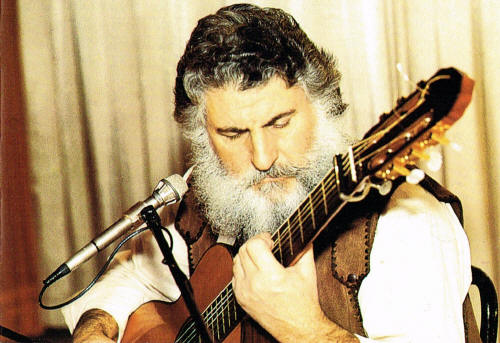José Teodoro Larralde Saad ( Huanguelén , province of Buenos Aires , 22 of October of 1937 ), known simply as José Larralde , is a singer – songwriter and poet Argentine that stands out in the country milonga . He is one of the most prominent references of his genre and of Argentine popular music. In 1995 he received the Konex Platinum Award as the best male folk singer of the decade in Argentina.
Biography
Born in the town of Huanguelén, in the southwest of the province of Buenos Aires, of Iraqi and Basque descent, from a very young age, at the early age of 7, he began to write verses of critical content that, throughout his life , they will talk about trades, situations and characters that crossed their path.
In addition to dedicating himself to composition and singing , he worked as a bricklayer , mechanic , rural worker , tractor driver and welder, and continued working while he made his first recordings.
His irruption was sudden, and the famous singer Jorge Cafrune had a lot to do with it . Larralde dedicated to his artistic work, in his hometown, he longed to meet him and, knowing that his neighbor José Dip had a relationship with him, he frequently asked him to introduce him. One night in 1966, when he was at a barbecue at his uncle Eduardo Saad’s house, José Dip fulfilled his long-awaited wish, and that is how Larralde made Cafrune know some of his songs. The acceptance was immediate: after hearing him sing, Cafrune asked José Dip to call Hernán Figueroa Reyes , CBS’s director of recordings, the next day, because he wanted to include some of the songs heard on his album in preparation, eventually released in 1967, titled Jorge Cafrune . It is in this way that, despite some setbacks, “Permiso” and “Sin pique” were finally present on the LP .
Cafrune returned to Huanguelén shortly after, as he had to perform in Girodías, more precisely at the Unión Social y Deportivo Club (even today you can see the warehouse that constitutes the club, at the exit of the town) which is almost 100 miles from there. On that occasion, he invited José Larralde to accompany him. Cafrune performed 3 songs and then introduced Larralde, who from then on became owner of the stage, with Cafrune’s consent, and sang several songs, including “Herencia pa ‘un hijo gaucho”, which reached the ears of the directors of the record company RCA, who soon decided to hire him.
In 1967, he recorded the first of twenty-eight albums released in Argentina , not counting reissues and compilations.
He has found a way to make himself known, despite the fact that he has always fled from promotions and mass rallies. His records have been sold in Germany , Australia , Brazil , Chile , Colombia , Spain , Mexico , Paraguay , Uruguay and Venezuela , among other countries.
In 2013, “Quimey Neuquén”, a song by Marcelo Berbel and Milton Aguilar, which was recorded by Larralde on his first album, was used for the Buried chapter , corresponding to the fifth season of the American television series Breaking Bad .
He speaks his truths with his folk music , singing against all kinds of what he considers injustices and inequalities.

